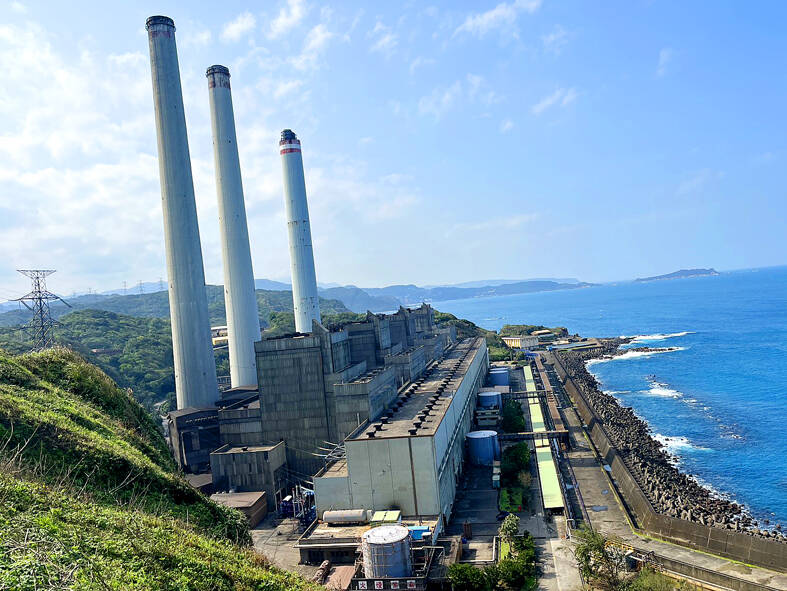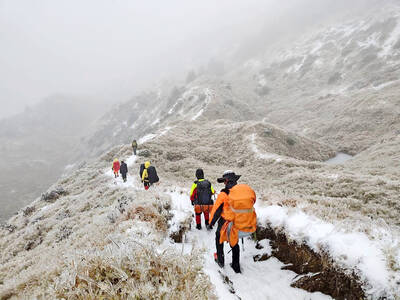The Keelung Environmental Protection Department yesterday agreed to inspect the Hsieh-ho Power Plant and ask Taiwan Power Co (Taipower) to suspend on-site activities to investigate allegations of soil pollution.
The project to convert the fuel-fired power plant into a gas-fired power plant was approved on Feb. 26, with all 17 members of the environmental impact assessment committee agreeing to the project.
Taiwan People’s Party (TPP) legislators Chen Gau-tzu (陳昭姿), Vivian Huang (黃珊珊) and Chang Chi-kai (張啟楷) along with environmental groups yesterday held a news conference to call on the Ministry of Environment and the Keelung City Government to investigate claims that Taipower concealed excessive contamination of total petroleum hydrocarbons, polychlorinated biphenyl and heavy metals in the soil at the site of the power plant.

Photo: Lu Hsien-hsiu, Taipei Times
Huang said that the committee approved the project on Feb. 26, despite evidence that Taipower was concealing alleged excessive contamination in the soil.
The ministry refused to provide minutes of the meeting out of concern that committee members might be targeted, but it could have at least provided a summary of the meeting, she said.
The reasons behind the committee’s decision to approve the project should be revealed, Huang said, adding that the ministry should not reduce itself to “Taipower’s environment ministry.”
Chang said that the committee is involved in procedural injustice, as the project should not have been approved before the problem of alleged contamination was resolved.
The minutes of the meeting should be released and the city government should test the site’s soil to see whether it is contaminated, he said.
Chen said there was a conflict of interest when Taipower commissioned Pacific Engineers and Constructors to conduct contamination tests and compile the examination report.
She was referring to a slide in a presentation made by the company to Taipower — which was provided by a whistle-blower — which said that contaminants could be diluted by “turning the soil” or that contamination spots be “avoided” during the sampling.
The ministry and the city government should take responsibility, and require Taipower to submit the concealed data and suspend its activities at the site to prevent it from destroying evidence, Chen said.
Wild at Heart Legal Defense Association attorney Tsai Ya-ying (蔡雅瀅) said an examination report showed that the contamination could have been a result of fuel-fired fly ash, stainless steel eroded by acid rain or previously contaminated construction spoils.
To stop fly ash or eroded stainless steel from contaminating the soil, the power plant’s No. 3 and No. 4 fuel generators should cease operations and old equipment should be removed as soon as possible, she said.
The alleged contaminated construction spoils should be strictly regulated and must not be used for land reclamation or other construction projects to avoid secondary pollution, Tsai said.
The government should establish a public-private task force to investigate the alleged contamination and supervise the project, she said, adding that the Taiwan Watch Institute and the Taiwan Environmental Protection Union have professional resources available.
Association chairman Chen Hsien-cheng (陳憲政) said that the ministry attempted to shirk its responsibilities, as the review processes stipulated by the Soil and Groundwater Pollution Remediation Act (土壤及地下水污染整治法) and the Environmental Impact Assessment Act (環境影響評估法) are mutually independent.
The former aims to remediate existing contamination, while the latter can be used to assess future environmental risks, he said.
Soil pollution remediation and environmental impact assessments are interconnected, and Taipower should not base its environmental impact assessment results on misleading information, Chen Hsien-cheng said.
Waimushan Conservation Action convener Wang Hsing-chih (王醒之) said the city government should inspect the site to see if Taipower falsified the data by “turning soils.”
It should also require Taipower to suspend all activities, especially at places where the soils are yet to be sampled and tested, he added.
Keelung Environmental Protection Department Deputy Commissioner Kuan Feng-chu (管鳳珠) said the city government expects the ministry to lead the investigation and that additional funding is required to conduct soil testing.
Soil and Groundwater Pollution Remediation Fund Management Board deputy executive secretary Wang Jen (王禎) said the ministry would evaluate the feasibility of allocating more funding to the effort after the city government submits a formal request.

Trips for more than 100,000 international and domestic air travelers could be disrupted as China launches a military exercise around Taiwan today, Taiwan’s Civil Aviation Administration (CAA) said yesterday. The exercise could affect nearly 900 flights scheduled to enter the Taipei Flight Information Region (FIR) during the exercise window, it added. A notice issued by the Chinese Civil Aviation Administration showed there would be seven temporary zones around the Taiwan Strait which would be used for live-fire exercises, lasting from 8am to 6pm today. All aircraft are prohibited from entering during exercise, it says. Taipei FIR has 14 international air routes and

The Ministry of National Defense (MND) today released images of the military tracking China’s People's Liberation Army (PLA) movements during the latest round of Chinese drills around Taiwan. The PLA began "Justice Mission 2025" drills today, carrying out live-fire drills, simulated strikes on land and maritime targets, and exercises to blockade the nation's main ports. The exercises are to continue tomorrow, with the PLA announcing sea and air space restrictions for five zones around Taiwan for 10 hours starting from 8:30am. The ministry today released images showing a Chinese J-16 fighter jet tracked by a F-16V Block 20 jet and the

Snow fell on Yushan (Jade Mountain, 玉山) yesterday morning as a continental cold air mass sent temperatures below freezing on Taiwan’s tallest peak, the Central Weather Administration (CWA) said. Snowflakes were seen on Yushan’s north peak from 6:28am to 6:38am, but they did not fully cover the ground and no accumulation was recorded, the CWA said. As of 7:42am, the lowest temperature recorded across Taiwan was minus-5.5°C at Yushan’s Fengkou observatory and minus-4.7°C at the Yushan observatory, CWA data showed. On Hehuanshan (合歡山) in Nantou County, a low of 1.3°C was recorded at 6:39pm, when ice pellets fell at Songsyue Lodge (松雪樓), a

NO SHAME IN RETREAT: Hikers should consider turning back if the weather turns bad or if they do not have sufficient equipment, the Taroko park headquarters said Two people died of hypothermia over the weekend while hiking on Hsuehshan (雪山), prompting park authorities to remind hikers to bring proper equipment and consider their physical condition before setting out in the cold weather. Temperatures dropped over the weekend, bringing snow to high altitudes in Shei-pa National Park. One hiker, surnamed Lin (林), who on Friday was traveling with a group of six along the Hsuehshan west ridge trail, lost consciousness due to hypothermia and died, the Shei-pa National Park Headquarters said. On Saturday, another hiker, surnamed Tien (田), in a group of five on the southeast of the west